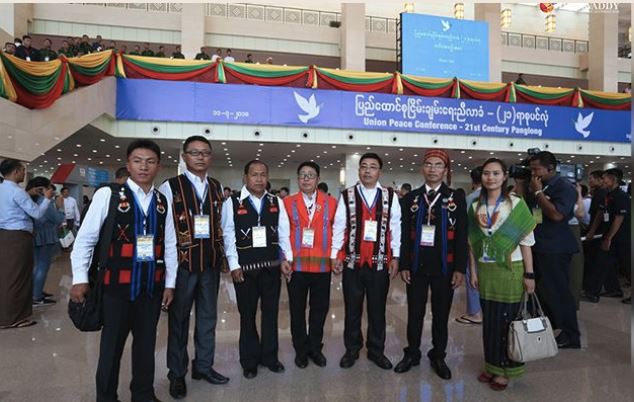Naga Rebels Say Peace Talks May Suffer if Military Does Not Free Leaders

![]()
News Desk:
The National Socialist Council of Nagaland-Khaplang (NSCN-K) says it will struggle to keep up peace talks with the Myanmar military if it does not release all members of the armed rebel group it has detained, including those on its negotiating team.
In early March, more than a month after taking control of the NSCN-K’s headquarters in Sagaing Region, the military arrested 10 of the group’s political leaders and six fighters, including captains.
Five of the detainees were released on April 5, leaving the fighters and the five leaders charged under the Unlawful Associations Act in custody, NSCN-K liaison officer Jüvlengthong (or Cue Hlaing Thong) told the Irrawaddy.
He said the six fighters were being held by the military and the leaders by the Khamti district police.
The five released were Eno Ngaitum, Eno Manglwan, Eno Athrom and Eno Longsa — the NSCN-K’s ministers for health, education and legal affair and deputy minister for agriculture, respectively — and Eno Tomthong, a member of the group’s central committee.
Jüvlengthong said “further peace negotiations would be difficult as both Chairman U An Kam and Vice Chairman U Kyaw Wan Sein, who lead the NSCN-K peace committee, as well as our home affair minister are among the detainees.”
Colonel Than Naing, spokesman for the military’s Northwestern Command, confirmed that the military released five of the detainees “because, according to our initial investigation, they were not directly involved in the matter even though they are with the NSCN-K.”
In late March, President’s Office spokesman U Zaw Htay said the office was reviewing whether the charges against the five NSCN-K leaders still in custody were appropriate.
The military accuses the NSCN-K of supporting ethnic Assam and Manipur — also known as Kathae — rebel groups in eastern India. Though the NSCN-K denies the claim, the military says it took control of the group’s training schools and arrested 36 people in ethnic Naga areas between January and March.
Jüvlengthong said the group has written to the government’s National Reconciliation and Peace Center, led by the State Counselor Daw Aung San Suu Kyi, and the Office of the Commander-in-Chief asking them to intervene but have yet to hear back.
He said the NSCN-K entered into a bilateral ceasefire with the government and military in 2012 because it trusted them and withdrew from its headquarters peacefully when the military came to seize it in January, and so where “very upset” by the military’s latest moves.
A Naga affairs analyst who asked to speak anonymously said the military had invited the Manipur into Sagaing in the first place.
“The Tatmadaw [military] tends to change its positions depending on the political landscape,” the analyst told The Irrawaddy. “If they want to blame, they can do so any time. So now they accuse the Naga armed group for political reasons.”
Whether the NSCN-K leaders can legitimately be charged for supporting a group that is not officially designated an insurgent organization also remains an open question.
“It is unclear how the government considers the Assam and Kathae rebels unlawful groups under Myanmar law,” the analyst said.
U Aung Htut, chairman of Naga Tradition, Literate and Culture (Central), a non-government group, said the five NSCN-K leaders are due to appear in court on April 19.
He said his group has sent letters requesting their release to the President’s Office, state counselor, military chief and ethnic affair minister but received to replies.
“The five NSCN-K leaders can only be freed when the Tatmadaw drops the charges against them for the sake of peace and stability in the region,” he said.
“We raised the issues to respective authorities because we want stability in the Naga region and we hope for the best solution,” he added. “We just don’t want any further instability because of this incident.”
U Aung Htut said the fighters should not have been detained either because they only stayed behind at the group’s headquarters when it was abandoned to the military in case the military needed their help.
Local sources say the military has imposed restrictions on movement in the area since taking over the base.
“People do not dare to go to their farms, and roads between their villages and markets are closed, which makes it hard for them to buy basic food items such as rice, oil and salt. They cannot enjoy freedom to movement. It is a violation of their basic rights,” the Naga affairs analyst said.
The Naga were granted a self-administered region under the military-drafted 2008 Constitution and run it out of Lahe Township. And while the NSCN-K signed a bilateral ceasefire deal in 2012, it has no interest in joining the Nationwide Ceasefire Agreement. The armed group wants to bring the Naga on either side of the Myanmar-India border under one rule and has asked for tri-partite negotiations between it and both governments.